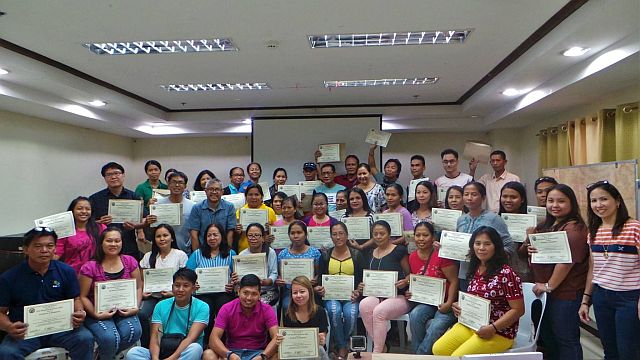
Participants of the trainer’s training and workshop on community-based ecotourism receive their certificates of attendance. (CONTRIBUTED)
Ecotourism, in simple terms, means management of tourism and conservation of nature. This is achieved by maintaining a fine balance and ecology on one hand and the needs of local communities for businesses, new skills income-generating employment and a better economic status on the other.
The Cebu provincial government is sincere about ecotourism.
A four-day “Trainer’s Training and Workshop on Community-Based Ecotourism” was conducted by Cebu Investment and Promotions Office (CIPO) at the Capitol Social Hall last April 5-7.
The collaboration between CIPO and nine local government units (LGUs) in southern Cebu aimed to enhance knowledge and build opportunities for 60 stakeholders to benefit from sustainable ecotourism. The activity was led by Boboi Costas, an award-winning innovator in community-based ecotourism.
Participants in the workshop were from the municipalities of Argao, Dalaguete, Alcoy, Boljoon, Oslob , Santander, Samboan, Ginatilan and Alcantara.
Some terms used link tourism development with conservation of natural and cultural resources. These include: ecotourism, nature-based travel, adventure travel, sustainable tourism and alternative tourism.
In all these aspects, eco-tourism is showing the way ahead by being inclusive at the same time strengthening rural communities.
Participants believed that the workshops and series of trainings will not only promote local tourism but also empower tourism stakeholders to make a positive impact, as well as achieve revenue goals and business priorities.
In this program, CIPO makes an effort to help the stakeholders in southern Cebu to discover, and evaluate by themselves those potential ecotourism sites in their town as well as support the need for various initiatives.
Ecotourism best practices, culture, cuisine, crafts and textiles, hospitality, waste management were among the matters discussed as well as legislation and government policies in relation to tourism laws and protected areas.
The importance of nature-based tourism is not lost. The LGUs are fully aware that it can bring numerous socioeconomic benefits to a locality.
Still, some LGUs are neither exploiting this potential nor managing current nature-based tourism effectively. This is evident from the low priority generally assigned to tourism planning and coordination.
It is also evident from the fact that many protected areas are deteriorating quickly as a result of over-visitation and insufficient investment in protected area management.
Although a number of participants expressed interest and awareness, Costas was apprehensive that the workshop or training won’t be that effective to a few because some attendees were just representatives of a municipality.
“Some municipalities still look at tourism as low priority. Some don’t even have a tourism office or officer yet,” Costas said.
“While some are almost ready to launch, such as Alcoy, they need support from the government for infra and roads,” he added.
Alcoy is not only known for its white sandy beaches, coral reefs, cove and mangroves but it boasts of an approximately 800-hectare protected forest area. Exciting flora and fauna discoveries have been reported in Alcoy in the past couple of years.
Argao, a popular culture and nature destination, will soon open new tourist spots this year in Barangays Apo, Anahaw and Basa. Tourism Officer Jotham Saragena said that stakeholders are working on getting funding mechanisms in place.
“Barangays did cultural mapping last year and new sites are declared as tourist spots through a resolution recently approved by the municipality,” Saragena said. /PR